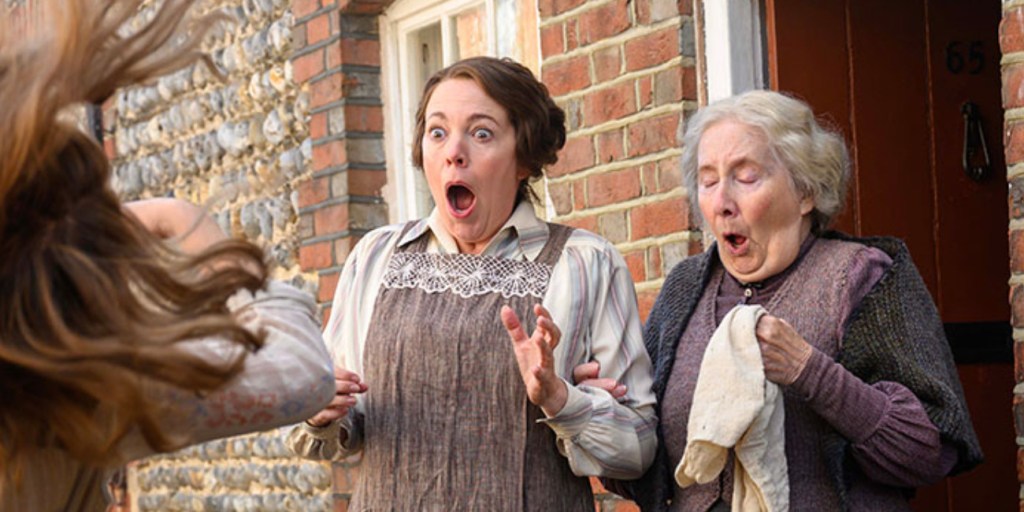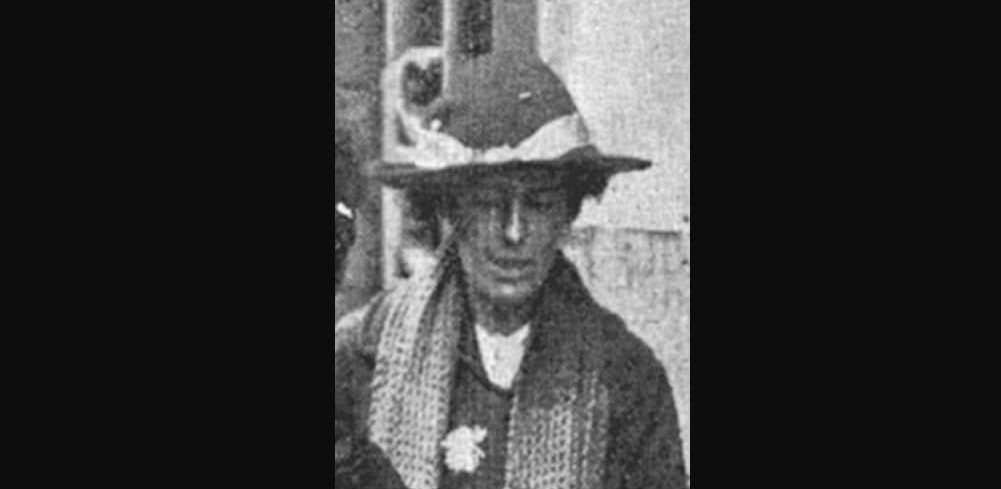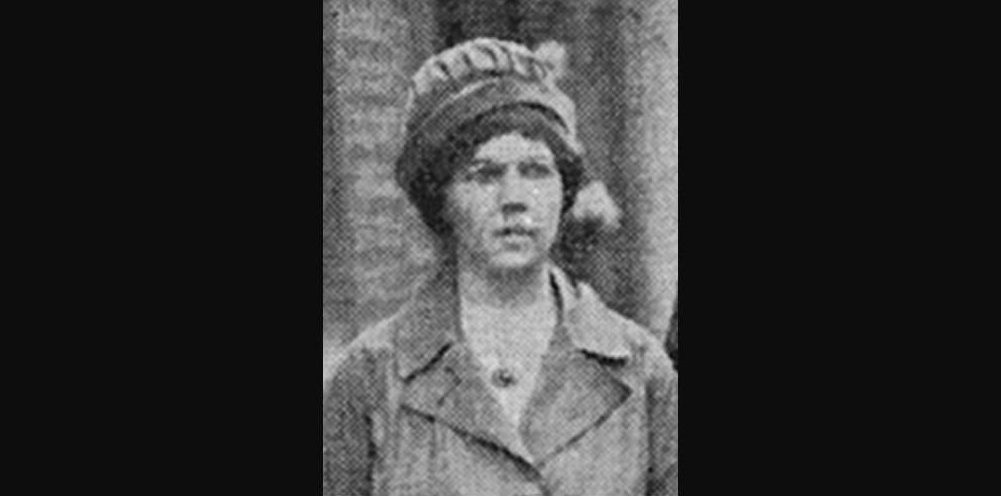The dark comedy thriller film, ‘Wicked Little Letters,’ depicts a case of libel between two neighbors, Edith Swan and Rose Gooding, in the town of Littlehampton, U.K., in 1920. After a series of profanity-filled letters are sent to the Swan household, specifically targeting Edith, who lives with her mother and father, a police investigation is sparked into the matter. Edith’s father, Edward, and the constables suspect Rose Gooding, an Irish migrant woman who was once on friendly terms with Edith, as the sender behind the anonymous epistles, owing to her well-known use of vulgar language in the neighborhood.
Directed by Thea Sharrock, the British film sheds light on the prevailing attitude in society towards a woman’s reputation, as well as the general oppression of female voices during a turbulent era of civil upheaval. At the heart of the narrative is the relationship between Edith and Rose, whose interactions begin with warmth but become increasingly strained owing to the hate mail flying around the neighborhood. Naturally, the themes in ‘Wicked Little Letters’ become an intriguing topic for discussion, prompting questions about the real-life genesis of Edith and Rose and whether their scandal is based on a true story!
Wicked Little Letters Sheds Light on an Actual Libel Case
‘Wicked Little Letters’ is rooted in a real-life case of hateful letters being sent to residents of Littlehampton during the early 1920s. The screenplay for the film was penned by Jonny Sweet, who was intrigued by the historical case and wanted to depict the scandal engulfing two neighbors – Edith and Rose – whose relationships soured after an argument over their communal garden. For the most part, the film is an accurate chronicle of the events surrounding the Littlehampton letter case, with slight deviations in the timeline and omissions of specific details.

According to reports, Edith Swan and Rose Gooding came into contact with one another after becoming neighbors on Western Street. Their two houses shared a common passageway and a garden space. While their initial interactions were friendly – finding a connection through household work – their relationship became strained after a disagreement over their garden. Soon after their estrangement, letters started appearing in the Swan household, attacking the family with vulgar messages that were occasionally signed under the initials of Rose: “R.,” “R.G.,” or sometimes “Mrs. Gooding’s compliments.” Consequently, suspicion fell on the woman as more letters were received by people within Rose’s circle of friends.
The foul language in the letters immediately interested Sweet, who told Digital Spy, “The letters were so pathetic in their attempt to be swearing and aggressive that I just thought that was a very interesting character.” Eventually, Rose Gooding was privately prosecuted by Edith while being held in the Portsmouth Prison and was charged with criminal libel. When she returned to civilian life two months and two weeks later, the letters started resurfacing again, with further doubt and aspersion cast upon her. She was sent back to prison again with a sentence of 12 months of hard labor to follow.
Edith Swan: The Real-Life Sender Behind the Letters
While Rose Gooding had taken the fall for the Littlehampton letters, the real culprit was Edith Swan herself, who was penning the epistles under Rose’s name, framing and destroying her reputation. Some modern-day historians claim that she was living with psychological conditions, which may have played a part in her plan to dismantle Rose’s standing in the seaside town’s community. In the film, Edith is shown to be a meek person who lives under the oppressive subjugation of her father, Edward Swan, a dynamic that leads to her poisoned pen proclivities and her need to vent her frustrations through the letters.

Although reports of her father’s misogynistic views are not as concrete as presented within the narrative, it is likely that given the era of the crime and Edith’s existence, she may have gone through a similar circumstance, which may have been the source of her purported mental health challenges. Elaborating on Edith’s letters, Jonny Sweet said, “She had a lot of pent-up fury, she wanted to be a vicious, brutal, hardcore swearer, but she didn’t have the capacity to do that.” As Edith kept writing her letters, she was careful not to send them while Rose was incarcerated in prison to stop suspicion being cast upon her.
However, her model citizen outlook ultimately landed her in trouble. During Rose’s second stint in prison, the letters continued circulating among Littlehampton residents. Edith even reported finding a notebook full of profanities revolving around her to the police. As a result, it looked increasingly unlikely that Rose Gooding was behind these letters, considering that all mail going in and out of prison was monitored. After a link was established between Edith’s handwriting and those of the letters, alongside a series of other mounting evidence, the woman was made to stand trial in 1921. Despite the police’s hard work, the jury found her not guilty.
It wasn’t until 1923 that Edith Swan was caught in a carefully conceived plan concocted by the police involving invisible ink markings on stamps. Although the woman continued to deny her involvement and guilt in the Littlehampton letter scandal, she was found guilty by the jury, who sentenced her to twelve months of hard labor, which was Rose’s sentence during her second stint in prison.
Rose Gooding Suffered Several Injustices
Rose Gooding went through a nightmarish period after being accused and charged with libelous letters that she had nothing to do with. The woman moved to Littlehampton in 1918 with her husband Bill and her daughter Dorothy, who was born out of wedlock in 1909. As shown in the film, this was a matter of grave reputational damage back in the 1900s. While she and Edith got off on a good footing initially, an argument over an overflowing trash can in the communal garden led to souring their relationship. Consequently, Rose’s life was uprooted when letters implicating her as their sender started circulating around the neighborhood filled with crude messages and expressions.

In the film, Rose is depicted as an Irish migrant, which differs from her real-life persona. She was born in Lewes, Sussex, England, and served two sentences in prison. Her second stint in jail is omitted from the film to perhaps smoothen the continuity within the narrative. When it became clear to the police that Rose had been wrongfully convicted in the Littlehampton libel case, she was awarded £250 in compensation. Despite being proven innocent, Rose was still shunned by the local community as they had already formed an impression of her as someone spreading vile rumors and comments about people. Ultimately, it was not until 1923, when Edith Swan was found guilty of writing the letters, that Rose Gooding was able to overcome the nightmare of her reputational damage.
Read More: Why Did Edith Write the Letters in Wicked Little Letters, Explained


You must be logged in to post a comment.